Black Voters, Green Issues
Air Date: Week of January 25, 2008
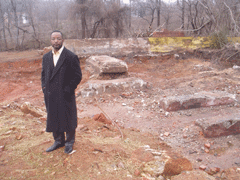
(Photo: Jeff Young)
Race is starting to play a role in the Democratic race for the White House. What environmental issues are most important to African American voters? Living on Earth's Jeff Young found South Carolina voters concerned about the toxic waste that plagues so many black neighborhoods.
Transcript
GELLERMAN: From the Jennifer and Ted Stanley Studios in Somerville, Massachusetts - this is Living on Earth. I’m Bruce Gellerman, in for Steve Curwood.
South Carolina plays a pivotal role in presidential politics, and not just for candidates. It’s also an opportunity for African Americans, who make up half the voters in the state’s democratic primary, to have their issues heard. One of their major concerns is the environment. We sent Living on Earth’ s Jeff Young to South Carolina to talk green issues with black voters.
[ CHILDREN’S CHOIR SINGING: “I have decided to follow Jesus…”(FADES UNDER)]
YOUNG: If you want a quick check of the political pulse in African American communities, put on your Sunday best and get to the churchouse. At Friendship Baptist, in Columbia, Reverend Anthony Dicks told his church they wouldn’t just hear his sermon, they’d hear speakers from the Clinton and Obama campaigns.
DICKS (speaking from pulpit): It has been a long tradition in the African American culture. It’s critical my brothers and sisters, it’s critical.
YOUNG: Just across town at Zion Baptist, John Edwards attended a Martin Luther King Day ceremony.
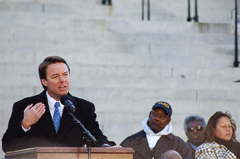
John Edwards (D-NC) at NAACP Martin Luther King Day on the Dome in Columbia, SC (Photo: Flickr/Justin Shearer)
YOUNG: All over South Carolina, politics found a place in the pulpit. And it was a good chance to ask churchgoers about the environmental issues on their minds.
Emily Washington and Bob McIntyre say green energy and global warming are important.
WASHINGTON: Absolutely it’s the life of the planet, so it’s top tier.
MCINTYRE: Personally I’m interested in oil and what they can do to change our dependency on it. Because I feel we have the resources here they’re just not being used.
YOUNG: That’s not so different from what you might hear from any demographic group. Polls show people across the board are concerned about the changing climate and soaring energy costs. But Shirley McClary of Columbia zeroed in on an issue she thinks is of particular interest to African American voters.
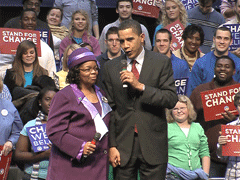
In this photo, Senator Barack Obama rallies in Greenwood, South Carolina. Sen. Obama won the endorsement of South Carolina lawmaker Joe Neal. Neal says tackling environmental justice issues means being able "to build consensus, and I think Obama is able to do that." (Photo: Flickr/Barack Obama)
MCCLARY: Well, all this dumping that they’re doing now in South Carolina, that is very much a concern of ours because we’re the ones living there and our children is the one being affected by this.
YOUNG: South Carolina NAACP conference president Lonnie Randolph, Jr., says this notion of environmental justice could be a strong motivator for black voters.
RANDOLPH: Of course it is, it’s a quality of life issue. Environmental issues produce health problems. This is one of the worst states in the nation as it pertains to the health of African Americans. And unfortunately the vast majority of those dumps are in African American neighborhoods, so environmental racism is alive and doing quite well here in South Carolina.
YOUNG: Democratic state representative Joe Neal sees that first hand. His rural, largely African American district on the outskirts of Columbia has to deal with mercury in the rivers, nuclear waste and contaminated groundwater.
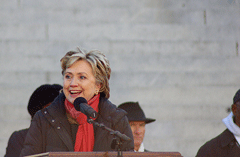
Sen Hillary Clinton, at NAACP Martin Luther King Day on the Dome in Columbia, SC. "Hillary Clinton is leading the way" on environmental justice issues, says Norris McDonald of the African American Environmentalist Assoc. (Photo: Flickr/Justin Shearer)
NEAL: We have a superfund site, uh, happens to be right across the street from the nuclear fuel reprocessing plant. And when you talk about South Carolina as a whole, the state has 24 superfund sites. 23 of them are in African American communities. So, what we find in this state, I think is pretty typical for the country. Pollution and waste tends to follow the path of least resistance.
YOUNG: Do people suffering the brunt of that, do they connect that to something they should vote on?
NEAL: Well, often they do. I think that many will make the decision as to who they will vote for not explicitly on the basis of their own situation, but on the larger sense of fairness and justice in all policies, and particularly in environmental policy.
YOUNG: The endorsement of an African American state lawmaker is highly coveted in this highly competitive state. Neal was considering Barack Obama and one other candidate.
NEAL: I also like John Edwards and his emphasis on everyday working people, and fairness and justice. But I think Senator Edwards has a… he comes into politics as a trial attorney and he’s used to fighting. Politics is a little different here. We need to be able to build consensus, and I think that Obama is able to do that. And that’s why I chose him.
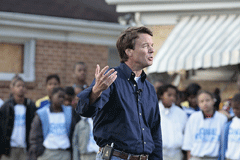
Former North Carolina Senator John Edwards wins kudos from environmental justice activists for his focus on poverty. He launched his presidential campaign from the Lower Ninth Ward of New Orleans.
(Photo: (c) Rachel Feierman)
MITCHELL: (walking while talking) This is where, as you can see, a lot of the debris that was uncovered. 1500 tons of coal ash debris and hazardous materials was removed from the site.
YOUNG: The Arkwright neighborhood of Spartanburg also has two superfund cleanup sites: an old fertilizer plant and a closed city landfill, all side by side in a black neighborhood.
MITCHELL: On this side of town folks back then thought that it was an area where that’s where they considered the people as nobody. So that’s where that landfill is located, and you can see all of the industrial facilities were located right fence line to the neighboring community.
YOUNG: But those nobodies, in this case, that was you and your family?
MITCHELL: Yes. You could look out my window as a child and I could see the landfill. My sister, she died of acepsyssomphilitis—germ poisoning—and my father, he died of lymphoma. And we ain’t…I mean throughout the community it’s like every other house, or every house. Then you start to see a pattern of problems there.
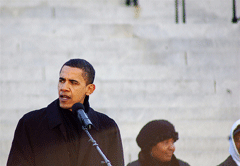
Barack Obama (D-Ill) at NAACP Martin Luther King Day on the Dome in Columbia, SC (Photo: Flickr/Justin Shearer)
CLINTON (speaking at opening of hearing): Today’s hearing represents the first senate hearing in history devoted to environmental justice.
[CROSSFADE INTO MITCHELL]
MITCHELL: You know, sitting in that hearing, Senator Clinton put it in perspective so well. She was able to capsulize it and look at solutions, and you would need just that, someone that can listen, and as she stated during this campaign, someone who can actually manage the change.

"You could look out my bedroom window as a child and see the landfill." South Carolina lawmaker Harold Mitchell grew up near this and two other toxic sites. Of the 24 Superfund cleanup sites in the state, 23 are in black neighborhoods. (Photo: Jeff Young)
MCDONALD: Well Hillary Clinton I would have to say on environmental justice is probably leading the way addressing that issue.
YOUNG: Are you surprised Senator Obama has not shown more leadership on this issue at all?
MCDONALD: It’s not puzzling at all. He’s appealing to the white vote. And if he is perceived as being black, and when I say that I mean Jesse Jackson or Al Sharpton, complaining about racial issues. It makes whites uncomfortable. And I can understand his not wanting to be pigeon holed quote as the ‘black’ candidate, but it has negative consequences, when then he can’t address substantive issues, such as environmental justice.
YOUNG: McDonald says Clinton has advanced environmental justice through her policy and shrewdly positioned herself politically. She’s outflanked Obama on an issue that could prove potent to African Americans around the country who would make environmental justice part of their voting decision.
For Living on Earth, I’m Jeff Young in Columbia, South Carolina.
Links
African American Environmentalist Association blog
The ReGenesis Project in Spartanburg, SC
View or read testimony at the US Senate's first-ever hearing on environmental justice
Living on Earth wants to hear from you!
Living on Earth
62 Calef Highway, Suite 212
Lee, NH 03861
Telephone: 617-287-4121
E-mail: comments@loe.org
Newsletter [Click here]
Donate to Living on Earth!
Living on Earth is an independent media program and relies entirely on contributions from listeners and institutions supporting public service. Please donate now to preserve an independent environmental voice.
NewsletterLiving on Earth offers a weekly delivery of the show's rundown to your mailbox. Sign up for our newsletter today!
 Sailors For The Sea: Be the change you want to sea.
Sailors For The Sea: Be the change you want to sea.
 The Grantham Foundation for the Protection of the Environment: Committed to protecting and improving the health of the global environment.
The Grantham Foundation for the Protection of the Environment: Committed to protecting and improving the health of the global environment.
 Contribute to Living on Earth and receive, as our gift to you, an archival print of one of Mark Seth Lender's extraordinary wildlife photographs. Follow the link to see Mark's current collection of photographs.
Contribute to Living on Earth and receive, as our gift to you, an archival print of one of Mark Seth Lender's extraordinary wildlife photographs. Follow the link to see Mark's current collection of photographs.
 Buy a signed copy of Mark Seth Lender's book Smeagull the Seagull & support Living on Earth
Buy a signed copy of Mark Seth Lender's book Smeagull the Seagull & support Living on Earth

